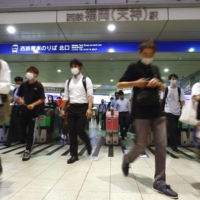A COVID-19 state of emergency took effect in seven more prefectures on Friday, with restrictions on business activity aimed at curbing Japan’s largest yet wave of infections.
Ibaraki, Tochigi, Gunma, Shizuoka, Kyoto, Hyogo and Fukuoka will be under the measure until Sept. 12, joining Chiba, Saitama, Tokyo, Kanagawa, Osaka and Okinawa.
Under the state of emergency, major commercial facilities such as department stores and shopping malls are being called on to limit the number of customers allowed in at the same time, in addition to restaurants and bars being barred from serving alcohol or offering karaoke. Establishments not serving alcohol are being asked to close by 8 p.m.
Prime Minister Yoshihide Suga has also called on the public to reduce outings to crowded places by 50%, and for firms to have employees work from home and cut the number of commuters by 70%.
Chief Cabinet Secretary Katsunobu Kato told a news conference on Friday that foot traffic in Tokyo’s major entertainment districts was down roughly 35% compared to early July, referring to the latest figure, and vowed that the government will continue efforts to reach the 50% target.
A further 10 prefectures — Miyagi, Yamanashi, Toyama, Gifu, Mie, Okayama, Hiroshima, Kagawa, Ehime and Kagoshima — on Friday came under a quasi-state of emergency, which allows governors to target specific areas with restrictions and carries smaller fines for noncompliance, in addition to six areas already under the measure.
Their addition means 29 of Japan’s 47 prefectures, or roughly 84% of the population, are now under some kind of restrictions on business activity, less than two weeks after the Tokyo Olympics wrapped up and days before the Paralympics begin.
“Personally, I want to telework, but my company does not want to introduce it,” a Kobe resident in his 30s said at Sannomiya Station.
His employer called on staff to work remotely during Japan’s first virus emergency declared last year, “but it seems my company has gotten used to the state of emergency” and is not eager to implement telework, said the man, who was on his way to work in Osaka.
The latest measure is the country’s fourth virus emergency, yet a man in his 50s said at the station, “The train was crowded as usual.”
Sunao Nakayama, 61, who was walking in the Tenjin shopping arcade in the city of Fukuoka, said, “The cases of infection won’t go down unless the government imposes a lockdown.”
While some people in the country are calling for more drastic measures such as the lockdowns that have been imposed in some other countries, Suga has expressed doubt over the effectiveness of those steps.
“If the government wants to promote remote work, then it should be uniformly introduced throughout the nation,” said Shigekazu Tanaka, 58, a resident of Sendai, Miyagi Prefecture.
On Thursday, the nationwide count of new COVID-19 cases in a single day topped 25,000 for the first time. The number of patients in serious condition hit a record high for the eighth consecutive day at 1,816 as of midnight Thursday, with the highly contagious delta variant of the virus spreading rapidly.
The government decided earlier this month to only allow patients with severe symptoms to be hospitalized, a policy that has drawn controversy amid some instances of people who were unable to access medical care dying at home.
Suga has said he will not lift the state of emergency until “the provision of medical care is secured.”
In a time of both misinformation and too much information, quality journalism is more crucial than ever.
By subscribing, you can help us get the story right.
SUBSCRIBE NOW



